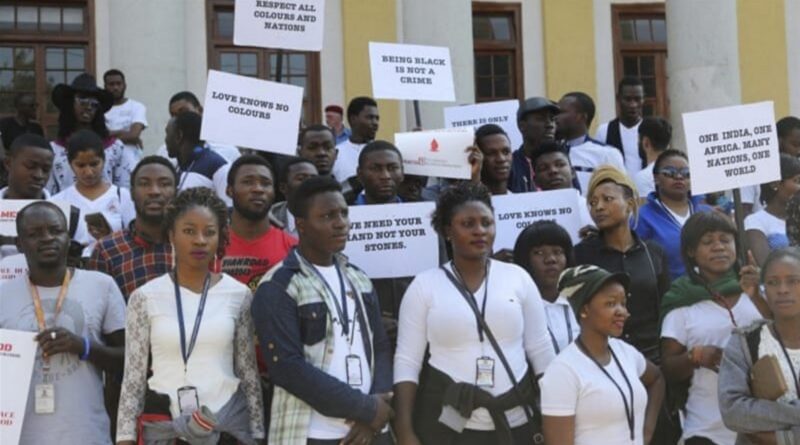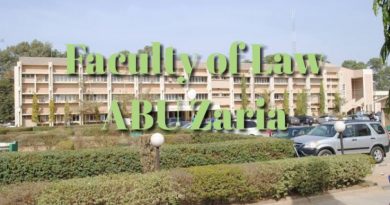Education Abroad: Sad Tales Of Nigerian Students In Top 7 Hostile Countries
The craze for a foreign certificate, Incessant strikes by the Academic Staff Union of Universities, irregular academic calendars and the poor state of education, the lack of appreciation for what we have at home amongst others, have forced many Nigerian students outside the country for education.
Some of these countries have, however, proved to be hell for Nigerian students. While some of these students are alive to share their stories, the same cannot be said of those who lost their lives in foreign lands.
Exploitation, racist behavior, and the killing of Nigerian students by locals in foreign countries have become a trend in recent times. Justice was not served in many of the cases while the Nigerian government has been criticized for not living up to its responsibilities in demanding justice for its young citizens.
In this report, SaharaReporters interviewed some Nigerians students about their ugly experiences while studying abroad, exposing the countries that are notorious for being hostile and why the Nigerian Government needs to act.
Tales Of Nigerian Students in India
A Nigerian student has a piece of advice for other Nigerians planning to study in India. “Don’t come to India.”

“I want to advise Nigerian students and other Africans to know that we’re not really welcomed in India. I advise my fellow Nigerians not to come over here for studies. There is racism in India. Once I collect my certificate here, I will be able to reveal the horrible experience I went through. For now, please don’t mention my name. I am about to graduate. I don’t want to be victimized.”
The Nigerian youth who sent the above quote to SaharaReporters has been in India for four years, studying agriculture in one of the Indian universities. When he left Nigeria four years ago, he was full of enthusiasm about the promises of studying in India.
“I left Nigeria four years ago because someone told me that the school I am currently enrolled in India has a good reputation for agriculture research,” he told Sahara Reporters, “I thought my experience in India was going to be a nice one.”
“I arrived in India only to find out the opposite. First, there is no agriculture laboratory and the facilities are poor. There is a lot of racism here. I am surprised it is so prevalent even in the academic community.”
India, a fast developing country, has recently become a top destination for Nigerian students, especially those interested in medical science courses. A data by the Association of Indian Universities showed there were 1202 Nigerian studying in India in 2017. That is the most recent record online.
According to the data, Nigeria ranks fifth in the biggest sources of international students in the country’s academic institutions behind Nepal (5,480 students), people of Indian birth who live outside India (4,557), Afghanistan (2,732), and Malaysia (1,357).
Indian universities are relatively cheap compared to European and American universities. That was the attraction for the young Nigerian who narrated his ordeal to Sahara Reporters. He has spent over N2m intuition alone but he says he can’t justify his expenses so far. Four years after, the young Nigerian has bitter tales to tell.
He said, “Recently it has gone worse; locals don’t want to lease their houses to Nigerians and other African students. There is a constant attack against Nigerians and other black students in India. Our lives are not safe. I regret coming to India and I am really looking forward to going back home.”
The tale of the young Nigerian may be shocking but it is unfortunately not the first in recent times. There have been several reports of a xenophobic attack against Nigerian students and other black nationals in India. In 2017, four Nigerian students, including Precious Amalawa and his brother, Endurance, nearly lost their lives in an attack targeted against blacks.
Endurance, who spoke with Sahara Reporters, says the attacks against Nigerians and other black nationals have become an annual ritual.
“Indians don’t welcome blacks, especially Nigerians. They think we are all drug peddlers. I don’t deal in drugs,” he told Sahara Reporters.
Cyprus and Turkey
Cyprus and Turkey share a border and Nigerian students in both countries have similar tales of racism to share. Cyprus is divided into south and north. There are many Nigerian students on the Turkish Republic of Northern Cyprus, a republic on the northern and eastern side of the island of Cyprus.

A Google search for the phrase “Nigerian students in Cyprus” would reveal negative stories. If three or four of the first ten results are not about the killing of Nigerian students, it will most likely be other harrowing tales of what Nigerian students go through in their quest for education.
Cyprus, for one, has attracted many Nigerian students over the years. Like India, the attraction is the relative lower tuition rate compared to other European countries.
Lower tuition rate is not the only reason. Cyprus universities are gaining global recognition in research. Rich Nigerians are also sending their children to Cyprus. Earlier in the year, the first daughter of Nollywood actress, Omotola Jalade-Ekeinde, graduated from the University of Cyprus. Nollywood actress, Rahama Sadat, has also joined the list of Nigerians who graduated from the Eastern Mediterranean University of Cyprus.
There is no accurate data on the current number of Nigerian students there but findings by Sahara Reporters reveal that it is a very hostile country for Nigerians to study.
It will be recalled that some years ago, the Senior Special Assistant to the President on Foreign Affairs and Diaspora, Abike Dabiri-Erewa, advised Nigerians to shun Cyprus because it was becoming unsafe for Nigerian students.
Last year, a 28-year-old university student, identified as Kennedy Taomwabwa, was reportedly killed by locals in the Turkish Cyprus’s province of Famagusta.
Taomwabwa was a student of Eastern Mediterranean University. He was killed by a group of eight locals, including three women, according to the police officials, reports claim.
“Some Nigerian students had bitter experiences with racist lecturers and colleagues in Cyprus,” Odiri told Sahara Reporters. Odiri obtained an undergraduate degree at the Cyprus International University.
“The good thing was that the university I attended had a near-zero tolerance for racism. There were stories of some random attacks on blacks on the streets, especially at night. A few died under questionable circumstances. The people of Cyprus found it difficult to adjust because they had not met so many black people all at once.
“The people from Turkey in Northern Cyprus were mostly against blacks dating their ladies. Why were they against dating their girls? They could not stand a black man dating a Turkish lady. During my academic sojourn there, if you dare befriend a Cyprus lady, the men would attack you. But I hear these days; it’s a lot better than when we first got there.”
Ukraine and Russia
Eastern European countries like Ukraine and Russia have also recorded many racists behavior against blacks, including Nigeria but not as deadly as Cyprus. English is not the official language in Ukraine and Russia.

Nigerian Ambassador to Russia
Many Nigerian students in these countries have to endure the harsh weather. They often encounter problems in communicating when they travel there for education. They have to first learn the native language to begin their studies.
Both countries have a long history of racism against black students. Between 2007 and 2012, the International Organisation for Migration recorded 204 racist attacks, mainly against Asians and Africans. Sixteen people were reportedly killed.
In 2014, two Nigerian students at the Donetsk National Technical University, Ukraine (Theresa Olaoluwa Oresanya, third-year Electrical Engineering; and Bede Olunna Ogbu, a graduate student of Engineering) reportedly died owing to alleged negligence on the part of the hospital authorities where they were admitted for treatment.
Last year, a 28-year-old Kharkiv man, Vitaly Kadnichansky, was sentenced to life imprisonment for racist and homophobic attacks against some Nigerian students, Kharkiv Human Rights Protection Group reports.
The story is similar in Russia. The Moscow Times had reported earlier last year how an unnamed Nigerian student was hospitalized after knife attack in southern Russia. Many Nigerian students on the Bilateral Education Agreement in Russia have also recounted one form of racism in Russia.
Speaking with Sahara Reporters, a Nigerian student, Akwara Michael, who recently completed his master’s degree at Ternopil National Technical University, Ukraine, confirmed that cases of racism against Nigerians and other black students are rife but noted that the hostilities had reduced compared to the early 2000s.
“Yes, racism is a problem in Ukraine. During early 2000, racism was severe in Ukraine. Sometimes ago, I visited the club for the first time and that was one of the worst experiences I had in the country. Being the only black in the midst of white students, it was easy to sight me. There was a clash which would have taken my life or left me injured but I escaped.”
Xenophobia in South Africa
Despite being an African country, South Africa has remained a volatile region for Nigerian students in the past decade. Constant xenophobic attacks against Nigerians and black nationals have continued unabated. Many Nigerians have been killed during the attacks. The Nigerian government has been accused of paying lip service to the issue.

It will be recalled that in 2017, South African policemen reportedly killed a 25 year old Nigerian, Ibrahim Olalekan-Badmus. Nigeria’s Consul General in South Africa, Godwin Adama, had told the News Agency of Nigeria that Badmus was allegedly killed at Vaal Vereniging, near Johannesburg.
More Nigerian students in South Africa are lamenting the situation. Sahara Reporters spoke with Oliyide Taofeek, a 21-year-old student of Public Administration at North-West University in South Africa. Taofeek, who is the treasurer of the International Students Chapter, North-West University, shed more light on the hostilities Nigerian students experienced in South Africa.
“Any time there is a xenophobic attack against Nigerians, we always hide like criminals so as not to be killed. Xenophobia is the only problem we have here. Attacks are unpredictable and one has to be careful not to become a victim. Usually, they tell us, Nigerian students, not to go out during those attacks,” he says.
“South Africa is a good place to study. The only fear is xenophobia. You don’t know when the next one would take place.”
Sad tales from Malaysia
Malaysia, a Southeast Asian country, began to witness an upsurge in the admission of Nigerian students to the country in early 2000. The country used to be friendly to Nigerian students but not anymore. Some analysts think that a series of cases involving some Internet scammers identified as Nigerians might have been responsible for the changes.

Last year, a Nigerian student identified as Uju Pious Ejikeonye, who hailed from Imo State, died after jumping from the 13th floor of a building in an alleged bid to escape from Malaysian immigration arrest.
Recently, Sahara Reporters published an SOS from the Malaysian chapter of Nigeria in Diaspora Organization. The group strongly condemned the alleged killing, extortion, and harassment of Nigerians schooling and living in Malaysia by the police.
The group says recent news of the raid and molestation of Nigerians in Malaysia by the police was unacceptable and gradually becoming the norm in the country.
In a statement issued signed by its President, Kingsley Nwankwo, the group also criticized the Nigerian High Commission in the country for failing to act on behalf of its citizens and not living up to its responsibilities.
Experts blame the Nigerian Government
A Nigerian lawyer based in South Africa, Daniel Okeke, has condemned the attacks and blamed the Nigerian government for paying lip service to the protection of its citizens in the Diaspora. “This is becoming worrisome,” he told Sahara Reporters. “I can’t count the number of Nigerians whose corpses were sent back home from South Africa.”
Also reacting to the issue, the Chairman, Nigeria Bar Association, Lekki Forum, Aremo Oladotun Hassan, also blamed the problem on the appointment of “inexperienced diplomats, who are mere political appendages and beneficial of ambassadorial appointments largesse.”
He said, “Appointment of inexperienced diplomats invariably negatively affects internal mechanism of our foreign missions to protect the average Nigerian student. Our scholarship support programs are dead, while we have no technical support plans to salvage the dying hydra-headed situation.
“The Nigeria nation still remains a mere geographical expression, due to blurred views of sentiments, parochial internal strife and ethnic bigotry, more dangerous than our foreign racist system. Perhaps, it pays a Nigerian student to bear the brunt of racism firestorm abroad than to survive the scorching heats of our chronic homegrown hatred for ourselves and regressive educational system.
“Several other silenced cases are brewing in Europe, UK, London, Mexico and South America and Asia, with evil tales of deaths and staunch hatred for blacks, but with an advance devaluation of the Nigerian citizens with the green passports.
“Unfortunately most of these crimes go without consequential punitive measures of justice, wherein shoddy investigation is conducted and later dismissed because sometimes the cost of ensuring due justice is not only expensive but rarely unavailable.”
Don calls for investment in education
A former Vice-Chancellor, Babcock University, Ilishan-Remo, Ogun State, Prof. Kayode Makinde, has also reacted to the issue. In an interview with Sahara Reporters, Makinde recounted his academic sojourn in Lebanon, England, US and France, noting it was not as bad as it is now.
He said, “Right now I believe Canada, New Zealand, and Australia are still welcoming. But the old continent of Europe is tired and broke. Terrorism and economic migrants don’t also help matters either. Nigerian youth’s current reputation for Internet scams has made it a lot harder for Nigerian genuine students getting a chance to prove themselves.”
The Ex-Babcock Vice-Chancellor said rather than lament about the harsh treatments meted out to Nigerian students, the Nigerian government should turn the problem into an opportunity by transforming education into an export commodity like the Philippines.
He said, “We need to make education so good in a way that foreign students will flood back to Nigerian Institutions as it used to be. The Nigerian Government needs to perfect its role as regulator and create an enabling environment for private and state operators who are better placed to attract and make higher investments due to greater productivity and better accountability.
“Then the Nigerian students who still feel the need to go abroad will do so by choice for greater intellectual, professional exposure, not by chance out of desperation for just anything that comes. This may be the opportunity we have been waiting for to turn the tide.”
Credit: saharareporters.com
For Advert Placement, Sponsorship, support, Article submission, suggestion, etc, Contact us: info@theabusites.com, +2349015751816 (WhatsApp)








